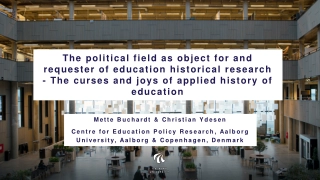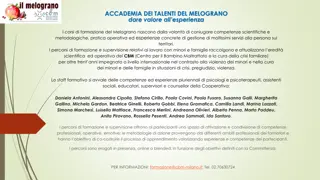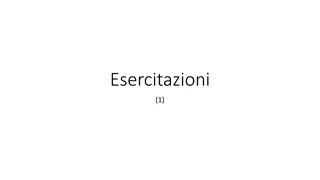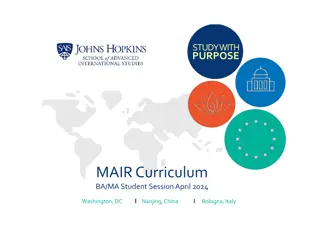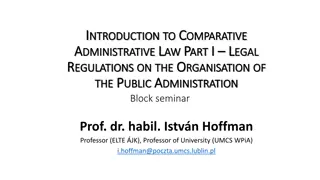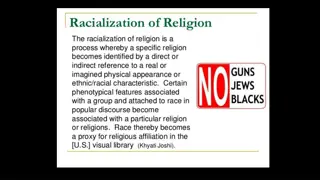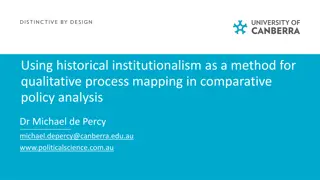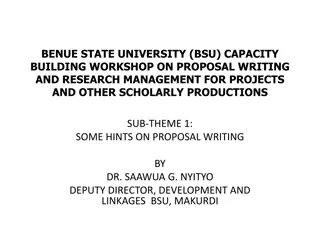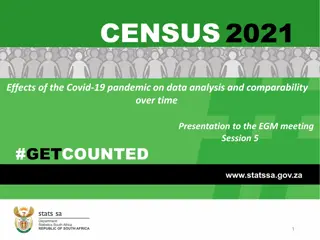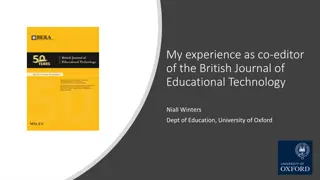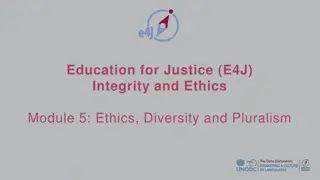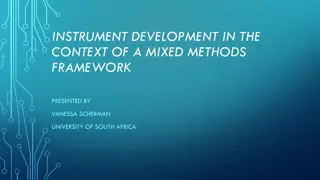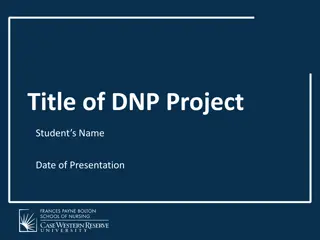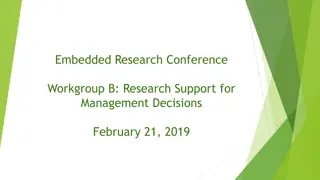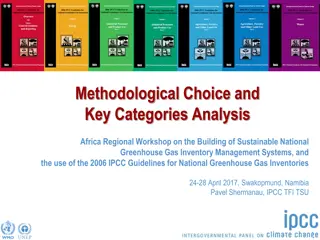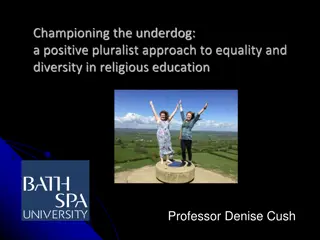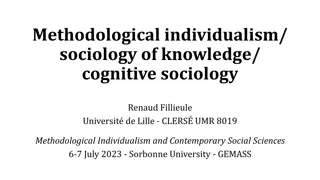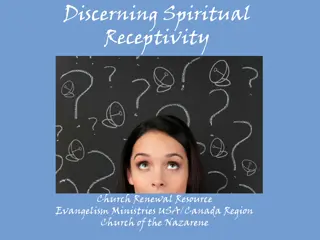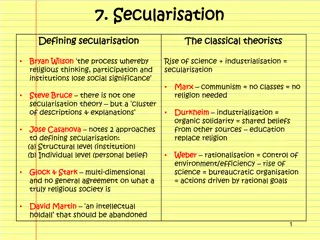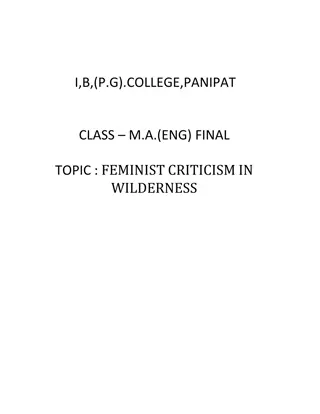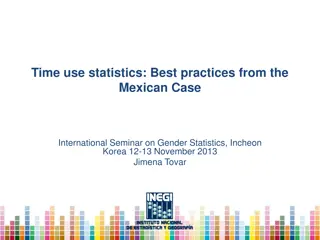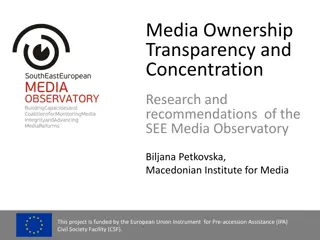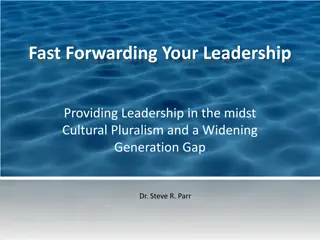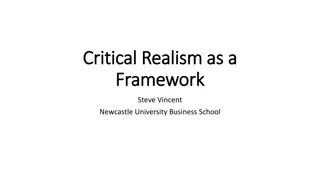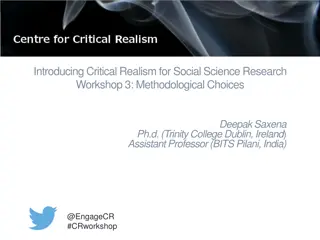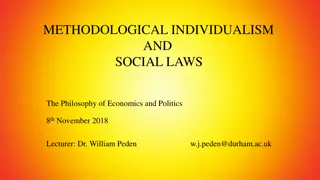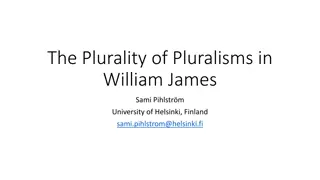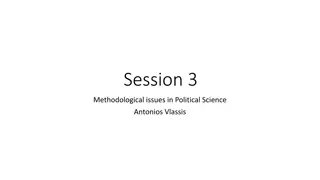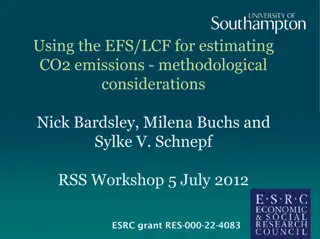Production & Service Systems Engineering Spring 2023
Methodological background for modeling workflow dynamics and resource allocation in modern operations, with a focus on production and service environments.
0 views • 30 slides
Balancing Political Field in Education Research
Analyzing the challenges of historical education research in politically contested fields, addressing methodological hurdles in meeting political demands for practical solutions. Can the history of education help evaluate policy and politics? Exploring the delicate balance between research objectivi
1 views • 9 slides
To be or not to be – ‘insider/outsider positionality’: Methodological challenges in researching a group of Iraqi Kurdish migrants in the UK.
Research by Chra R. Mahmud explores the methodological challenges in studying Iraqi Kurdish migrants in the UK, focusing on insider-outsider positionality. The study delves into the lived experiences of this group, examining the researcher's status and identity negotiation during the research proces
0 views • 18 slides
Courses and Training on Child Welfare and Family Support
The Melograno Training Courses focus on combining scientific and methodological skills with practical experience in managing a variety of services for individuals and families. Drawing from the expertise of professionals with extensive backgrounds in psychology, social work, education, and counselin
2 views • 32 slides
Methodological Video Analysis for Research Enhancement
Explore a series of methodological videos related to topics covered in class to enhance your understanding. Identify familiar information, new insights, and unclear concepts. Engage in self-assessment exercises to further reinforce your knowledge. Conclude with a session with the instructor for feed
0 views • 11 slides
Evolution of Development Communication: Theoretical Frameworks and Applications
Exploring the interdisciplinary field of Development Communication, this seminar delves into theoretical frameworks, methodological applications, and practical implications at the World Bank. It reflects on the evolution, theories, and practices underlying Development Communication paradigms, with a
4 views • 57 slides
MAIR Curriculum Overview and Academic Advising Services
The MAIR (Master of Arts in International Relations) program offers a comprehensive curriculum covering Leadership, Ethics, International Economics, Research Methods, and more. The program includes core courses, self-designed focus areas, and regional specializations. Academic advising services prov
0 views • 20 slides
Challenges and Solutions in Implementing Historical Competencies in Teaching
Explore the complexities and obstacles faced in implementing historical competencies in teaching, as discussed by Jens Aage Poulsen, a senior lecturer and researcher at HistoryLab, University College Lillebaelt, Denmark. The content delves into competence-based curriculum, core historical competenci
0 views • 7 slides
Comparative Analysis of Administrative Law Regulations in Public Administration
This block seminar delves into the realm of administrative law regulations, exploring topics such as the concept of Love Law, different legal approaches, pluralism in Roman law, modern pluralism, challenges of comparison, levels of comparison, and methods of legal comparison. The discussion includes
2 views • 83 slides
Evolution of Akbar's Religious Policy: A Historical Overview
In the 16th century, Akbar the Great implemented a revolutionary religious policy in the Mughal Empire. Initially a devout Sunni Muslim, Akbar evolved his stance to promote harmony and equality among all religions, fostering tolerance and understanding. This shift marked a significant departure from
1 views • 25 slides
Embracing Religious Pluralism for a Harmonious Society
Educate yourself on world religions and religious oppression, empathize with religious minorities, combat generalizations, and promote belief inclusion in all aspects of life for a more just and peaceful world.
0 views • 6 slides
Institutionalism and Methodological Issues in Political Science
Institutionalism is a foundational concept in political science, emphasizing the study of governing institutions and their role in shaping political behavior. It explores inductive and deductive approaches to research, highlighting the significance of empirical evidence and theoretical assumptions.
0 views • 19 slides
Understanding Historical Institutionalism in Comparative Policy Analysis
Analyzing the methodological approach of historical institutionalism in qualitative process mapping for comparative policy analysis. Addressing the challenges, such as thick description and path dependency, and exploring techniques to overcome shortcomings through comparison over time, process traci
1 views • 12 slides
Effective Proposal Writing: Key Strategies for Securing Funding
Proposal writing is essential in academia for securing funding. This workshop at Benue State University shed light on the importance of persuading reviewers and addressing unspoken needs of funding agencies. Key elements such as conceptual innovation, methodological rigor, and rich substantive conte
1 views • 21 slides
Impact of COVID-19 on Data Analysis and Comparability Over Time
The COVID-19 pandemic has significantly affected data analysis processes, with changes in data items, census reference dates, and collection methodologies. This has led to challenges in maintaining comparability over time. The presentation covers the background, changes in data items, South African
0 views • 12 slides
Insights from Co-Editing the British Journal of Educational Technology
Co-editor's experience at the British Journal of Educational Technology, highlighting the journal's focus on theoretical perspectives, methodological developments, and empirical research in educational technology. Details on the publication process, criteria for submission, and key themes explored b
0 views • 19 slides
Ethics, Diversity, and Pluralism in Education for Justice Module
Explore the significance of ethics, diversity, and pluralism in Module 5 of the Education for Justice (E4J) program. Delve into topics such as tolerance, moral role models, intersectionality, and the acceptance of differences. Understand how diversity can lead to both negative and positive outcomes,
7 views • 13 slides
Instrument Development in the Context of Mixed Methods Framework
Explore the intricacies of instrument development within a mixed methods framework as presented by Vanessa Scherman from the University of South Africa. The overview delves into mixed methods research, methodological norms, and closing the loop in research processes. Gain insights into the pragmatic
2 views • 40 slides
Genetic Manipulation in Environmental Biotechnology
Genetic manipulation strategies in environmental biotechnology involve techniques like gene splicing and molecular cloning to modify genes directly. These methods have various applications such as isolating genes, producing specific molecules, improving biochemical production, creating organisms wit
0 views • 20 slides
Comprehensive Analysis of a Doctor of Nursing Practice Project
This project delves into a detailed examination encompassing introduction, literature review, methods, background, problem statement, study objectives, key frameworks, methodological overviews, results, sample analysis, discussions, implications for practice, education, policy, and research.
0 views • 23 slides
Analytic Versus Continental Philosophy in the 20th Century: A Comparative Overview
In 20th-century philosophy, the divide between Analytic and Continental schools deepened but has seen recent attempts at reconciliation. Analytic philosophy emphasizes logic, language, and epistemology, requiring technical expertise, while Continental philosophy rejects metaphysical speculation and
0 views • 15 slides
Embedded Research Conference Workgroup B: Management Decisions Support
Workgroup B at the Embedded Research Conference focuses on providing research support for management decisions. The participants aim to identify and prioritize operational questions that could benefit from embedded research, work productively within the existing QI ecosystem, and create an inventory
0 views • 14 slides
Understanding Methodological Choice and Key Categories Analysis in Greenhouse Gas Inventory Management
Methodological choice and key categories analysis play a crucial role in managing uncertainties in greenhouse gas inventories. By prioritizing key categories and applying rigorous methods where necessary, countries can improve the accuracy and reliability of their emissions estimates. Key categories
0 views • 24 slides
Positive Pluralism in Religious Education: Embracing Diversity and Equality
This collection of reflections delves into Professor Denise Cush's exploration of Positive Pluralism in the realm of religious education. The approach emphasizes inclusivity, equality, and diversity, urging a shift towards a more open and accepting educational environment. Through various manifestos
0 views • 36 slides
Exploring Methodological Individualism in Sociology of Knowledge
Delve into the concept of methodological individualism within the sociology of knowledge, as scholars like Renaud Fillieule and Raymond Boudon emphasize the importance of understanding collective beliefs through the lens of individualistic methodology. Classical works by Robert Merton further enrich
0 views • 24 slides
Understanding Spiritual Receptivity in Today's Society
Explore the concept of spiritual receptivity in a society dominated by relativism and pluralism. Discover how Christians can effectively engage with individuals of different beliefs, advocating their faith and values to bring about life-changing results.
0 views • 19 slides
Understanding Religious Discrimination Laws in California Workplace
Learn about the regulations and protections under FEHA and Title VII in California, including religious exemptions, accommodation requirements, case studies, and best practices to address discrimination issues effectively. Discover the statistical insights on religious discrimination complaints and
0 views • 45 slides
Understanding Secularisation: The Decline of Religious Influence in Society
Secularisation refers to the process in which religious thinking, participation, and institutions lose their social significance. This phenomenon is influenced by factors such as the rise of science, industrialisation, changing social attitudes, and the disengagement of the church from society. Evid
0 views • 8 slides
Interviewing Young Adults with Life-Limiting Conditions: Methodological Reflections
This study reflects on the methodological aspects of interviewing young adults with life-limiting conditions, emphasizing inclusive research practices. The research employs interpretive qualitative methods, focusing on unexpected consequences of pandemic control measures. Participants, including bot
0 views • 10 slides
Religious Pluralism and Civil Society: A Paradox in Government Control
Understanding the intricacies of religious pluralism in the context of government control reveals a paradox where restricting religion can hinder social cohesion and economic growth. Through insights on the counterproductivity of control, the role of religious organizations in civil society, and the
0 views • 16 slides
Feminist Criticism in Wilderness: Analyzing Elaine Showalter's Essay
The essay by Elaine Showalter delves into feminist literary criticism, exploring its aims, challenges, and the perception of being in "wilderness." Showalter discusses the evolution of feminist criticism, the need for a solid theoretical framework, and the hurdles faced by feminist critics. She emph
0 views • 14 slides
Understanding Time Use Statistics in Mexico: Best Practices and Methodological Insights
Exploring the methodological features, surveys conducted, representativity considerations, and basic concepts underlying time use statistics in Mexico. The study focuses on how individuals allocate their time in daily activities, encompassing all types of work within households. Various surveys and
0 views • 25 slides
Enhancing Media Integrity in South East Europe
South East European Media Observatory focuses on media ownership transparency, concentration, and integrity in the region. Through research, reports, and grants, it aims to promote media freedom, pluralism, and ethical journalism. The Observatory identifies risks to media integrity across various ar
0 views • 26 slides
Navigating Leadership Challenges in Diverse Environments
Explore the dynamics of cultural pluralism and generational gaps impacting leadership. Discover strategies to address these challenges, including prioritizing people, fostering honesty, nurturing creativity, and diversifying leadership. Recommended resources and insights from experts offer valuable
0 views • 14 slides
Exploring Critical Realism as a Framework
This topic delves into the use of Critical Realism as a framework to develop knowledge about the social world, combining conceptual parts to bridge theoretical gaps and critique existing theories. It discusses ontological commitments, realist ontology, meta-theory, and domain-specific theories, emph
0 views • 22 slides
Exploring Critical Realism for Social Science Research: Methodological Perspectives
Delve into the methodological choices and key concepts of Critical Realism for social science research, including the nature of reality, researcher-inquirer relationships, and assumptions about human agency. Learn about the domains of reality in Critical Realism and the distinction between qualitati
0 views • 10 slides
Exploring Methodological Individualism in Social Science
Critiques of invoking external agents in economics, the importance of individual behavior in explaining economic outcomes, and various interpretations of methodological individualism in social science are discussed. The focus is on explaining social phenomena through terms related to individual beli
0 views • 23 slides
The Plurality of Pluralisms in William James
William James presents various forms of pluralism in his philosophical works, encompassing metaphysical, epistemological, ethical, metaphilosophical, and religious perspectives. He contrasts pluralism with monism and advocates for a more empirical approach. James's ideas challenge conventional monis
0 views • 12 slides
Rational Choice Theory in Political Science: Methodological Insights
Rational choice theory, a prominent approach in political science since the 1970s, focuses on strategic interactions among individuals seeking to maximize their own goals. Rooted in economic tools, this theory emphasizes rational decision-making based on individual interests and preferences. Methodo
0 views • 9 slides
Methodological Considerations in Estimating CO2 Emissions Using EFS/LCF
Various studies have utilized the EFS/LCF in the UK to estimate household emissions and policy impacts. This involves converting expenditures into emissions, which presents methodological challenges such as infrequent purchases and variations in data sources. The comparison of household CO2 emission
0 views • 17 slides

